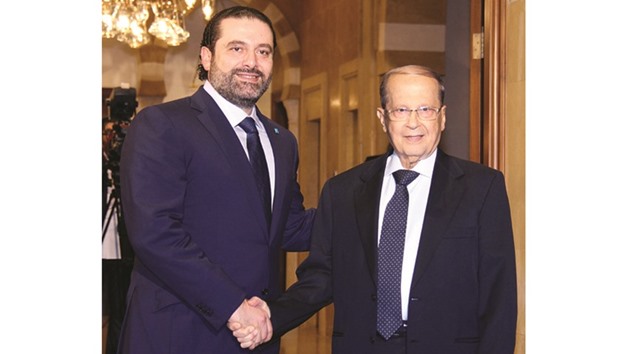Lebanon’s former prime minister Saad al-Hariri said yesterday he would back Hezbollah ally Michel Aoun to become president, a step that may help resolve the country’s political deadlock but which still faces considerable opposition.
“This decision comes from the need to protect Lebanon and the state and the people... but it is a decision that depends on agreement,” he said in a speech, describing Aoun as “the only option left”.
Lebanon has endured a protracted political crisis since parliament failed to elect a new president more than two years ago, paralysing government, causing a breakdown in many basic services and reviving fears of a slide back towards civil war.
However, Aoun will still face big obstacles towards his election as president by the country’s parliament, including opposition from parliamentary speaker Nabih Berri, leader of the Shia Amal movement which is also an ally of Hezbollah.
Four prominent members of Hariri’s Future Movement bloc in parliament, including former prime minister Fouad Siniora, told reporters they would not vote for Aoun.
Telecom Minister Boutros Harb, an ally of Hariri’s from a different party, said the same.
Still, the endorsement by Hariri, Lebanon’s leading Sunni Muslim politician who has long opposed Aoun’s Shia ally Hezbollah, represents an important step towards breaking the prolonged standoff between Lebanon’s political leaders.
Hariri hopes to become prime minister again if Aoun becomes president.
Hezbollah, Lebanon’s most powerful political player, released a statement welcoming moves to fill the presidency.
“In our discussions, we have finally reached common ground with General Michel Aoun... He does not want the state to fall, and neither do we,” Hariri said, pointing to the political dangers facing Lebanon due to the civil war in neighbouring Syria.
Parliament will convene on October 31 for a session to elect the president, the 46th such sitting since the term of the last president, Michel Suleiman, expired in 2014, each of which failed to gain the two-thirds quorum needed for a vote.
Under Lebanon’s power-sharing arrangement among its main sects, the presidency is reserved for a Maronite Christian, the premiership for a Sunni Muslim and the speaker of parliament for a Shia.
The last parliamentary election took place in 2009 and later scheduled ones were postponed because of a failure by the sitting parliament to agree on a new electoral law.
Aoun, a former army commander in his 80s, led one of two rival governments during Lebanon’s 1975-90 civil war before the Syrian army forced him into exile.
His main Christian rival for the presidency, Samir Geagea, endorsed him earlier this year.
Hariri, 46, son of the former prime minister Rafik al-Hariri who was assassinated in 2005, leads the “March 14” alliance against Hezbollah and its allies, which toppled his earlier administration from 2009-11 by resigning from it en masse.
Lebanon’s political fractures have been deepened by the war in neighbouring Syria, in which Hezbollah has militarily supported President Bashar al-Assad.
Hariri has accused Assad of being behind his father’s death, and gave evidence to an international court trying Hezbollah members charged with involvement in the killing.
But he has also said he is prepared to share power alongside his rivals.
The former prime minister’s position as Lebanon’s leading Sunni politician has been shaken, however, by a financial crisis at his Saudi-based construction business, raising concerns he may have lost the support of the wealthy state.

Lebanon’s former prime minister Saad Hariri greets former general Michel Aoun following a press conference in Beirut yesterday.
